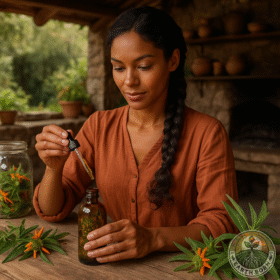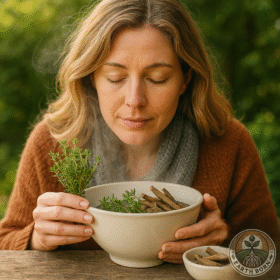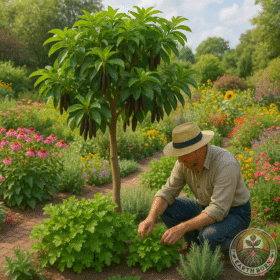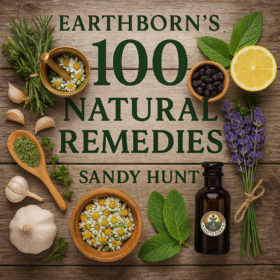-

🌿 Healing with Wild Dagga: 3 Remedies You Can Make at Home
Wild Dagga, also known as Lion’s Tail or Leonotis leonurus, is a proudly South African plant celebrated in traditional medicine for its anti-inflammatory, mild pain-relieving, and mood-enhancing properties.Below are three popular preparations you can try — including a tincture — with suggested dosages, safety tips, and important disclaimers. 1️⃣ Wild Dagga Tea (Infusion) – For Colds & Mild Coughs Ingredients: 1–2 tsp dried Wild Dagga leaves or flowers 1 cup boiling water Method: Place the dried leaves or flowers in a cup. Pour boiling water over the herbs. Cover and steep for 10 minutes. Strain and drink warm. Dosage: Adults:…
-

Respiratory
🌿 1. Thyme & Licorice Root Steam Inhalation Great for: Cough, congestion, sinus relief, bronchitis Ingredients: 1 tbsp dried thyme 1 tsp licorice root 2 cups boiling water How to Use: Add herbs to a bowl and pour over boiling water. Place a towel over your head and inhale the steam for 10–15 minutes. Breathe deeply! Benefits: Thyme is antimicrobial and great for loosening mucus. Licorice root soothes the throat and reduces inflammation in the airways. 🍋 2. Ginger, Lemon & Honey Herbal Tea Great for: Sore throat, cold, cough, immune support Ingredients: 1-inch piece of fresh ginger (sliced) Juice…
-

🌿 3 Natural Remedies Using Cardamom (Elettaria cardamomum)
Cardamom isn’t just a delicious spice—it has been used for centuries in traditional medicine to soothe digestion, freshen breath, and uplift the senses. To learn how to grow and care for Cardamon click hereHere are three simple ways to use it at home: ✨ 1️⃣ Digestive Soothe TeaWhy it works:Cardamom contains compounds like cineole and limonene that stimulate digestive enzymes, helping reduce bloating, gas, and indigestion. How to Make:✅ Lightly crush 4–5 green cardamom pods.✅ Steep them in 1 cup of freshly boiled water for 10 minutes.✅ Strain and sip slowly after meals. Disclaimer:If you have gallstones or are pregnant,… Read more…
-

🌿 3 Traditional Remedies Using African Pepper (Xylopia aethiopica)
African Pepper, with its spicy, aromatic pods, has long been used in African traditional medicine. Below are three tried-and-true natural remedies you can prepare at home using properly harvested and dried African Pepper. 🧺 Harvesting & Preparing African Pepper Pods When to Harvest: Wait until the seed pods have turned dark brown and begin to dry naturally on the tree (usually 2–3 years after planting). How to Harvest: Use clean, sharp pruning shears to clip the pods from branches. Avoid tearing the bark. Drying: Spread the pods in a single layer on a clean mesh tray in a warm, airy…
-

African Pepper (Xylopia aethiopica)
🌱 Intro 🌱 Introduction and historyXylopia aethiopica, commonly known as African Pepper or African Guinea Pepper, is a perennial evergreen tree native to West and Central Africa. Traditionally used in culinary and spiritual practices, its dried fruit pods have a spicy, peppery flavor akin to black pepper and are widely used in African cuisines. Historically, African Pepper was also traded across the Mediterranean and Arab world for its aromatic and medicinal properties. 💊 Medicinal BenefitsAfrican Pepper is revered in traditional medicine for its potent anti-inflammatory, antioxidant, antimicrobial, and analgesic effects. It is used to: Relieve gastrointestinal discomfort such as bloating…
-

🌿 Natural Remedies with Clove (Syzygium aromaticum)
Clove has been used for centuries in traditional medicine thanks to its potent antimicrobial, analgesic, and anti-inflammatory properties. Below are three simple, effective remedies you can make at home using dried clove buds or homemade clove oil. 1️⃣ Clove Tea for Digestive Relief Clove tea can help soothe bloating, gas, indigestion, and nausea. Ingredients: 2 whole dried cloves 1 cup boiling water Optional: a slice of fresh ginger or a dash of cinnamon Instructions: Place the cloves (and optional herbs) in a teacup. Pour over boiling water and steep for 5–7 minutes. Strain and sip slowly after meals. Dosage: 1…
-

Asthma Plant (Euphorbia hirta)
Euphorbia hirta, commonly known as Asthma Plant, Snake Weed, Garden Spurge, or Milkweed, is an annual herb native to tropical and subtropical regions, including much of Africa and Asia. Traditionally revered in Ayurvedic, Filipino, and African medicine, this hardy herb often grows as a weed in disturbed soils, but its healing powers have earned it a place in many medicinal gardens. The plant’s milky sap and fuzzy reddish stems are telltale features, and its ability to thrive in poor soils has made it a resilient favorite among herbalists. 💊 Medicinal BenefitsEuphorbia hirta is renowned for its use in managing respiratory… Read more…
-

🌿 Healing with Licorice Root: Harvest, Prepare & Remedy Recipes
Licorice (Glycyrrhiza glabra) has been used as a natural remedy for over 4,000 years across cultures from ancient Egypt to Traditional Chinese Medicine. Revered for its soothing properties and distinctive sweetness, licorice root offers potent benefits for the respiratory, digestive, and immune systems. Let’s explore how to harvest, prepare, and use licorice root safely and effectively in your home apothecary. 🌾 How to Harvest Licorice Root Licorice plants take 2–3 years to develop thick, nutrient-rich roots ideal for medicinal use. Here’s how to harvest them properly: Timing: Harvest in autumn, after the aerial parts of the plant begin to die… Read more…
-

🌿 Growing Licorice in South Africa: A Sweet Remedy Rooted in Tradition
Licorice (Glycyrrhiza glabra) is a hardy perennial native to parts of Western Asia and Southern Europe, renowned for its incredibly sweet root and powerful healing properties. With its feathery green leaves and delicate purplish-blue flowers, licorice is as beautiful as it is beneficial. Let’s explore how to grow this medicinal wonder and how to use it to support respiratory health, digestion, and more. 💊 Medicinal Benefits Licorice root contains the powerful compound glycyrrhizin, which is responsible for its signature sweetness and therapeutic effects. Traditionally, licorice has been used for: Soothing sore throats and coughs due to its demulcent and expectorant… Read more…
-

🧅 How to Use Onions in Natural Medicine
Often overlooked as just a kitchen staple, the onion (Allium cepa) is a powerful medicinal herb with a rich legacy in natural healing. Its sulfur compounds, flavonoids like quercetin, and essential oils make it a potent remedy for a wide range of everyday ailments. Whether raw, cooked, or infused, onions have been used for centuries to treat colds, coughs, skin infections, and more. Here are three tried-and-tested natural remedies using onions: 🍯 1. Onion Cough Syrup (Immune & Respiratory Support) This traditional remedy is fantastic for soothing sore throats, breaking up mucus, and boosting the immune system during colds or…


 **Meet Sprout!** Sprout is your friendly gardening companion at Earthborn, always ready with helpful advice on plant care, medicinal herbs, and natural gardening solutions. From seedling to harvest, Sprout provides expert guidance to nurture your garden and your well-being—making gardening easy, fun, and naturally rewarding.
**Meet Sprout!** Sprout is your friendly gardening companion at Earthborn, always ready with helpful advice on plant care, medicinal herbs, and natural gardening solutions. From seedling to harvest, Sprout provides expert guidance to nurture your garden and your well-being—making gardening easy, fun, and naturally rewarding.
